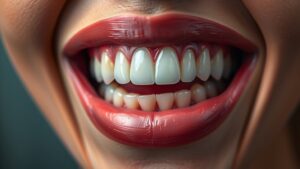The idea of regrowing teeth could sound like science fiction, but research suggests the body has untapped potential for dental repair. While humans don’t naturally regenerate full teeth like sharks, studies show stem cells in the gums and dental pulp can rebuild damaged enamel or dentin under the appropriate conditions. Specific nutrients, like vitamin K2 and collagen, may encourage this process by fortifying existing structures.
Emerging therapies also investigate stimulating tissue regrowth using proteins or scaffolds. Though complete regeneration isn’t yet possible, cognizance of these mechanisms offers hope for future breakthroughs in reversing decay and restoring oral health naturally.
Tooth Regeneration and Its Possibilities
Is it really possible to regrow teeth, or does that sound like something from science fiction? While full regrowth isn’t yet a reality, dental stem cell research shows promising steps toward repairing damaged teeth. Scientists are exploring how stem cells could rebuild tooth structures, potentially offering alternatives to fillings or implants.
Another key area is tooth enamel remineralization, which strengthens weakened enamel using minerals like calcium and phosphate. Though this doesn’t regrow entire teeth, it helps restore their surface, preventing decay. Current methods focus on enhancing the body’s natural repair processes rather than creating new teeth from scratch.
While challenges remain, advances in these fields could one day make partial or full regeneration achievable. For now, maintaining oral health through proper care remains the best way to preserve natural teeth.
The Role of Stem Cells in Natural Tooth Regrowth
Stem cells hold significant potential for natural tooth regrowth, offering a glimpse into how damaged or lost teeth could one day be repaired. Adult dental stem cells, found in the pulp of teeth, play a key role in tooth regeneration mechanisms. These cells can develop into different types of dental tissue, like dentin or enamel, under the right conditions.
Researchers are studying how to activate these cells to rebuild teeth from within, mimicking the body’s natural healing processes. While still in preliminary stages, this approach could reduce the need for artificial replacements. The process involves guiding stem cells to repair damage or even regrow entire teeth, though challenges remain in controlling growth and ensuring long-term success. This science brings hope for future dental care.
Nutritional Strategies to Support Tooth Regeneration
Several key nutrients play a vital role in supporting the body’s natural ability to repair and regrow teeth. Calcium and phosphorus strengthen enamel, while vitamin D guarantees proper absorption. Vitamin K2 directs minerals to teeth instead of soft tissues, and vitamin C backs gum health, preventing decay. Collagen-boosting nutrients like vitamin A and amino acids aid in rebuilding tooth structure.
Dietary supplements, such as magnesium and zinc, can fill gaps in a balanced diet, promoting remineralization. A healthy oral microbiome thrives on prebiotic fibers from fruits and vegetables, which reduce harmful bacteria. Fermented foods like yogurt introduce beneficial probiotics, further protecting teeth.
Avoiding sugar and processed foods prevents acid erosion, creating an environment where regeneration can occur naturally. Hydration also helps maintain saliva production, which neutralizes acids and fixes initial damage.
Lifestyle Changes to Promote Oral Healing and Regrowth
Beyond nutrition, daily habits play a big role in creating the right conditions for teeth to heal and regrow. Improving sleep quality and managing stress levels are key, as they directly impact the body’s ability to repair tissues. Poor sleep weakens the immune system, slowing healing, while chronic stress raises cortisol, which can damage gums and teeth. Simple adjustments, like sticking to a bedtime routine or practicing deep breathing, can make a difference.
| Habit Change | Benefit for Oral Healing |
|---|---|
| Consistent sleep schedule | Supports tissue repair |
| Stress-reducing activities | Lowers inflammation |
| Hydration | Keeps gums healthy |
| Avoiding teeth grinding | Prevents enamel damage |
| Gentle oral care | Protects sensitive areas |
Small shifts in routine foster an environment where regeneration thrives.
Emerging Dental Technologies for Tooth Regeneration
- Stem cell therapy: Uses specialized cells to regrow dental tissues, mimicking natural tooth development.
- Biomaterial scaffolds: Provides a framework to guide new tooth growth through supporting cell attachment and matrix formation.
- Gene editing: Modifies genes involved in tooth formation to improve regeneration.
- Growth factor applications: Stimulates dormant cells to rebuild enamel and dentin layers.
These technologies are still in development but hold promise for future dental care, lowering dependency on artificial replacements.
Conclusion
Though science hasn’t yet opened full tooth regeneration, it’s no coincidence that ancient wisdom and modern research agree—supporting the body’s natural healing can strengthen teeth. Stem cells whisper promises of regrowth, while nutrients and gentle care lay the groundwork. One day, a mix of biology and technology could make lost teeth a relic of the past. Until then, the mouth’s quiet repair work continues, one careful choice at a time.





